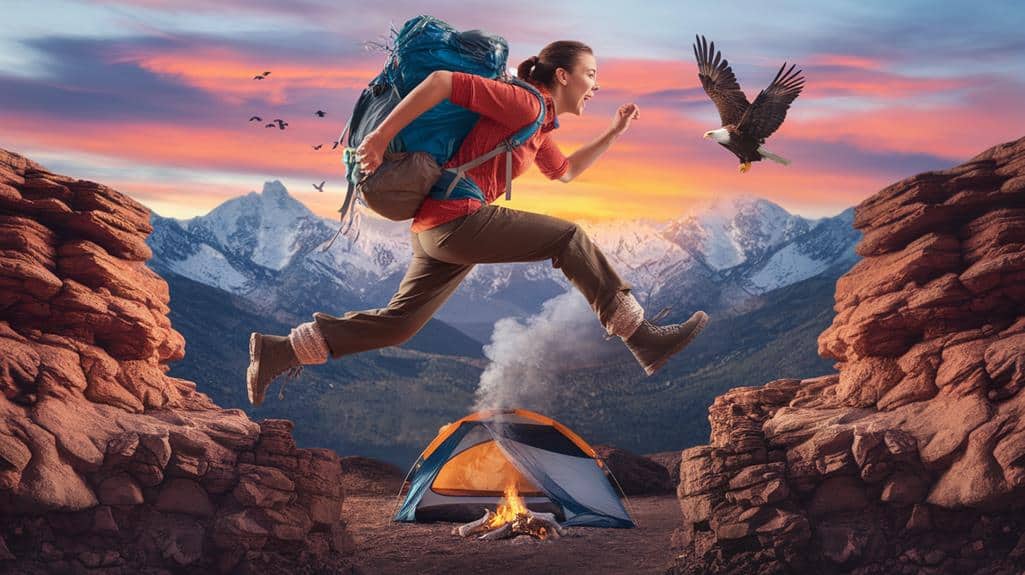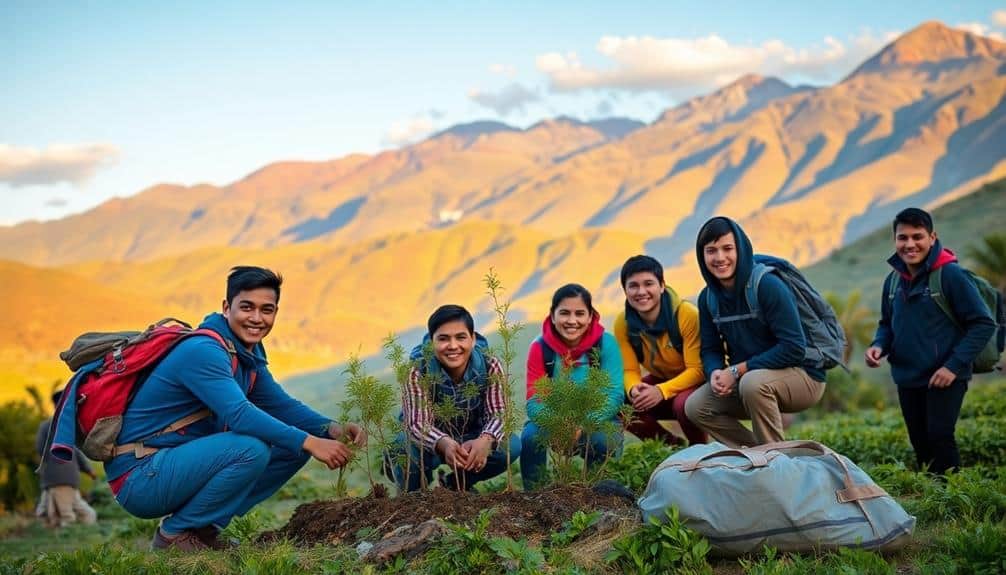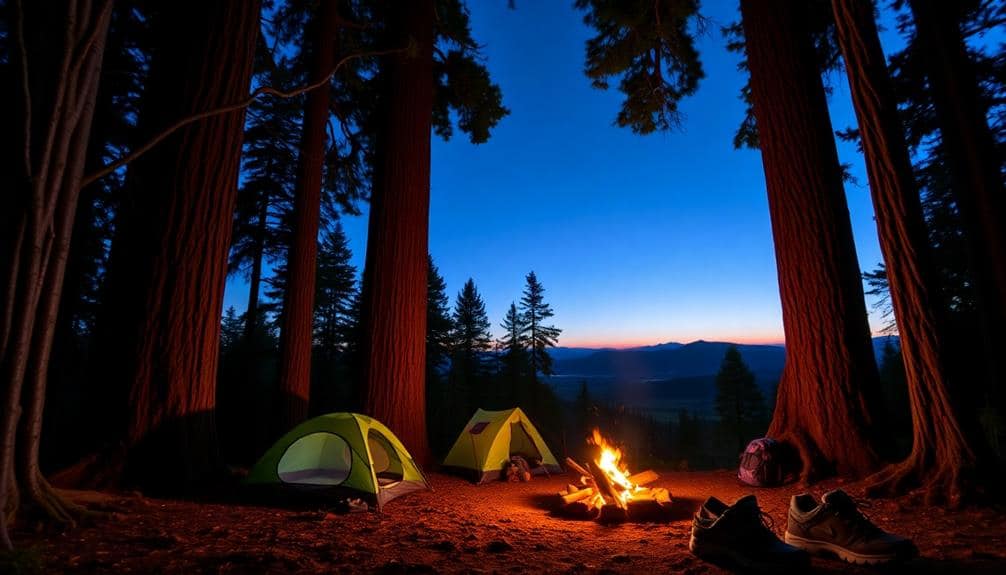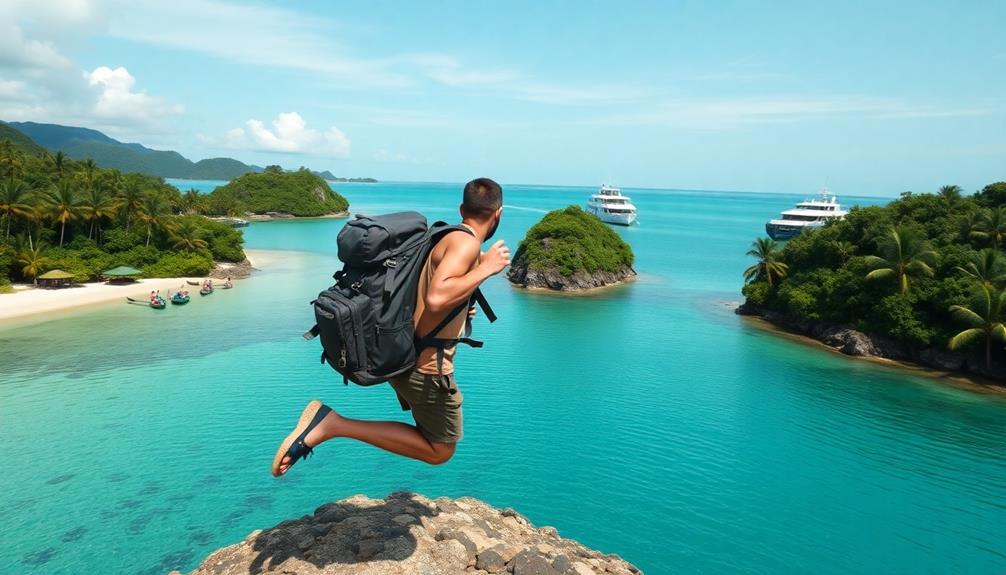
5 Cheap Thrills: Adventure Travel Without Breaking the Bank
Commence thrilling adventures without emptying your wallet with these five budget-friendly travel options. Backpack through Southeast Asia, where affordable accommodations and street food keep costs low. Engage in volunteer tourism in South America, combining meaningful work with cultural immersion. Couchsurf across Europe, staying with locals for free while experiencing authentic culture. Camp in national parks, enjoying breathtaking landscapes at minimal expense. Finally, island hop on a shoestring, exploring paradise destinations during off-seasons. Each option offers unique experiences, from cultural exchanges to natural wonders, allowing you to satisfy your wanderlust without financial strain. Discover how these budget-conscious approaches can transform your travel aspirations into reality.
In a Nutshell
- Backpack through Southeast Asia for budget-friendly adventures with affordable accommodations, street food, and cheap transportation options.
- Engage in volunteer tourism in South America, working on conservation projects or teaching English while enjoying low-cost living arrangements.
- Utilize Couchsurfing across Europe for free accommodations and cultural immersion, creating connections with local hosts.
- Camp in national parks to experience breathtaking landscapes and wildlife while keeping accommodation costs minimal.
- Go island hopping during off-seasons, using public transportation and staying in budget accommodations for affordable tropical adventures.
Backpacking Through Southeast Asia

Southeast Asia's backpacker trail offers budget-friendly adventures for thrill-seekers and culture enthusiasts alike. You'll find an array of affordable accommodations, from basic hostels to family-run guesthouses, typically ranging from $5 to $15 per night. Street food and local markets provide sustenance for as little as $1-3 per meal, allowing you to stretch your budget further. When packing for your trip, consider bringing a versatile laundry bag to keep your dirty clothes organized and contained, which can be especially useful for longer journeys. This can help you pack lighter and avoid excess baggage fees on budget airlines. Transportation options include cheap buses, trains, and budget airlines, with fares often under $20 for short hops between countries. To maximize savings, consider traveling during the shoulder season (April-June or September-November), when prices are lower and crowds are thinner. Don't miss out on free activities like temple visits, beach lounging, and urban exploration. With careful planning and a flexible itinerary, you can experience the region's diverse cultures, stunning landscapes, and vibrant cities without depleting your savings.
Volunteer Tourism in South America

For adventurers seeking meaningful travel experiences on a budget, volunteer tourism in South America offers a unique blend of cultural immersion and community service. You'll find numerous organizations throughout the continent that provide opportunities to work on conservation projects, teach English, or assist in community development initiatives. Countries like Peru, Ecuador, and Bolivia are popular destinations for volunteer tourism, offering a range of programs with varying durations and costs. When selecting a program, carefully research the organization's reputation, project sustainability, and impact on local communities. Consider factors such as accommodation, meals, and training provided. Many programs offer affordable packages that include lodging and some meals, making them cost-effective options for budget-conscious travelers. Before commencing your volunteer adventure, ensure you have appropriate hiking footwear to navigate diverse terrains comfortably. By participating in volunteer tourism, you'll not only save money on traditional travel expenses but also gain invaluable cross-cultural experiences and contribute positively to local communities.
Couchsurfing Across Europe

Couchsurfing enthusiasts can explore Europe on a shoestring budget while forging authentic connections with locals. This platform allows you to stay with hosts for free, providing an immersive cultural experience and significant cost savings. To maximize your couchsurfing adventure, create a detailed profile highlighting your interests and travel goals. Reach out to potential hosts well in advance, personalizing your requests and demonstrating genuine interest in their city and culture. When planning your trip, consider investing in a quality travel backpack to comfortably carry your essentials while moving between hosts and exploring new cities.
When couchsurfing, prioritize safety by thoroughly reading host reviews and trusting your instincts. Pack light, bringing a small gift for your hosts as a token of appreciation. Respect house rules and be prepared to adapt to different living situations. Engage with your hosts, participating in local activities and sharing meals when possible. This approach not only reduces accommodation costs but also offers unique insights into European cultures, making your adventure both budget-friendly and enriching.
Camping in National Parks

Nature lovers can experience breathtaking landscapes and wildlife while keeping costs low by camping in national parks. You'll find that most parks offer affordable campsite fees, ranging from $10 to $30 per night, which is drastically/substantially/considerably/tremendously cheaper than hotels. To maximize savings, invest in quality camping gear that's durable and lightweight. A 3-season tent, like the REI Co-op Half Dome SL 2+, provides ample space and weather protection for under $300. Don't forget to bring a portable stove, such as the MSR PocketRocket 2, which weighs only 2.6 oz and boils water in just 3.5 minutes. To avoid crowds and secure prime spots, make reservations well in advance, especially for popular parks like Yellowstone or Yosemite. Remember to follow Leave No Trace principles to preserve these natural wonders for future generations.
Island Hopping on a Shoestring

Island hopping offers an exciting alternative to camping for budget-conscious adventurers. You'll find numerous affordable options for exploring multiple islands without breaking the bank. Start by researching off-season travel dates and less-touristy destinations, which often offer significant savings. Consider booking ferry tickets in advance and opting for public transportation on each island to minimize costs. Look for budget accommodations like hostels, guesthouses, or even homestays, which can provide authentic local experiences at a fraction of the price of resorts. Many islands offer free or low-cost activities, such as hiking, snorkeling, and beach-hopping. To save on food expenses, try local markets and street vendors for inexpensive, authentic cuisine. By carefully planning your itinerary and prioritizing budget-friendly options, you can experience the thrill of island hopping without overspending.
Frequently Asked Questions
How Do I Stay Safe While Traveling on a Budget?
Ever wondered how to protect yourself while exploring on a tight budget? To stay safe during budget travel, always research your destination thoroughly, including local customs and potential risks. Keep valuables secure, use reputable accommodations, and be aware of your surroundings. Don't skimp on travel insurance, as it's indispensable for emergencies. Stay connected with loved ones, sharing your itinerary and check-in times. Trust your instincts, avoid risky situations, and remember that being budget-conscious doesn't mean compromising your safety.
What Vaccinations Are Recommended for Budget Adventure Travel?
For budget adventure travel, you'll need several essential vaccinations. These typically include routine immunizations like MMR, DPT, and polio, as well as hepatitis A and B. Depending on your destination, you may also require vaccines for yellow fever, typhoid, meningitis, or Japanese encephalitis. It's imperative to consult a travel clinic or your healthcare provider at least 4-6 weeks before departure, as some vaccines require multiple doses or time to become effective.
How Can I Earn Money While Traveling to Extend My Trip?
You'll be amazed at the countless ways to fund your never-ending journey! Consider remote work opportunities, such as freelance writing, graphic design, or online tutoring. Digital nomad visas are increasingly available, allowing you to work legally in various countries. Alternatively, explore work exchange programs like WWOOF or Workamping, where you'll trade labor for accommodation. Teaching English abroad, seasonal jobs in tourism, or even starting a travel blog can provide income. Remember, diversifying your income streams increases your chances of sustaining long-term travel.
What Travel Insurance Options Are Best for Budget Adventurers?
For budget adventurers, consider thorough travel insurance plans that offer a balance of coverage and affordability. Look for policies with high medical coverage limits, emergency evacuation, and trip cancellation protection. World Nomads and SafetyWing are popular options, providing coverage for adventure activities and flexibility for long-term travelers. Compare deductibles, exclusions, and claim processes carefully. Don't skimp on coverage for high-risk activities you're planning. Remember, the cheapest option isn't always the best; prioritize protection that matches your specific travel needs and risk tolerance.
How Do I Handle Language Barriers in Remote or Less-Touristy Areas?
To handle language barriers in remote or less-touristy areas, you'll want to prepare in advance. Download offline language apps, like Google Translate, and carry a pocket phrasebook. Learn basic greetings and essential phrases in the local language. Use visual aids, such as pictures or hand gestures, to communicate. Consider hiring a local guide who speaks both your language and the local dialect. Be patient, respectful, and willing to engage in non-verbal communication when necessary.
